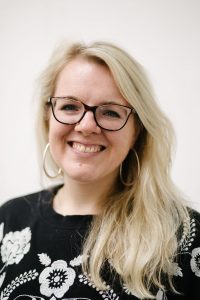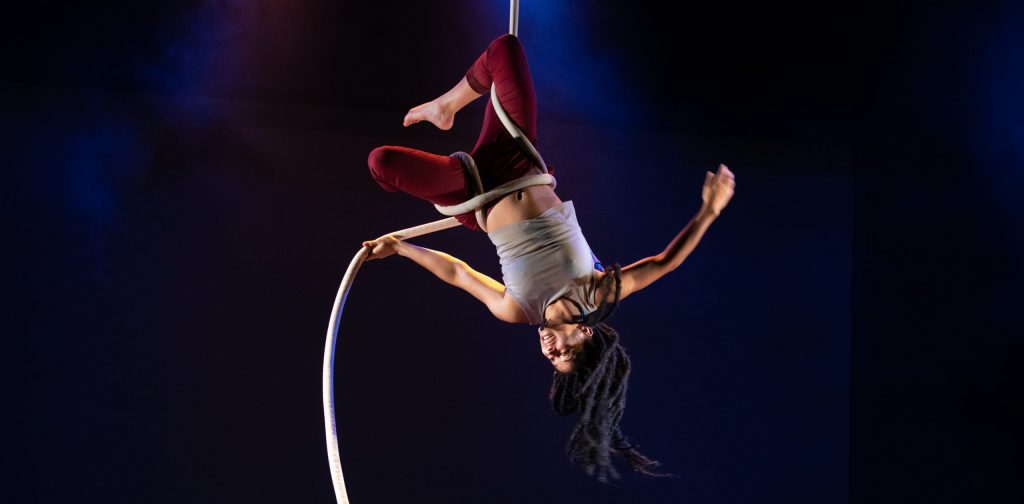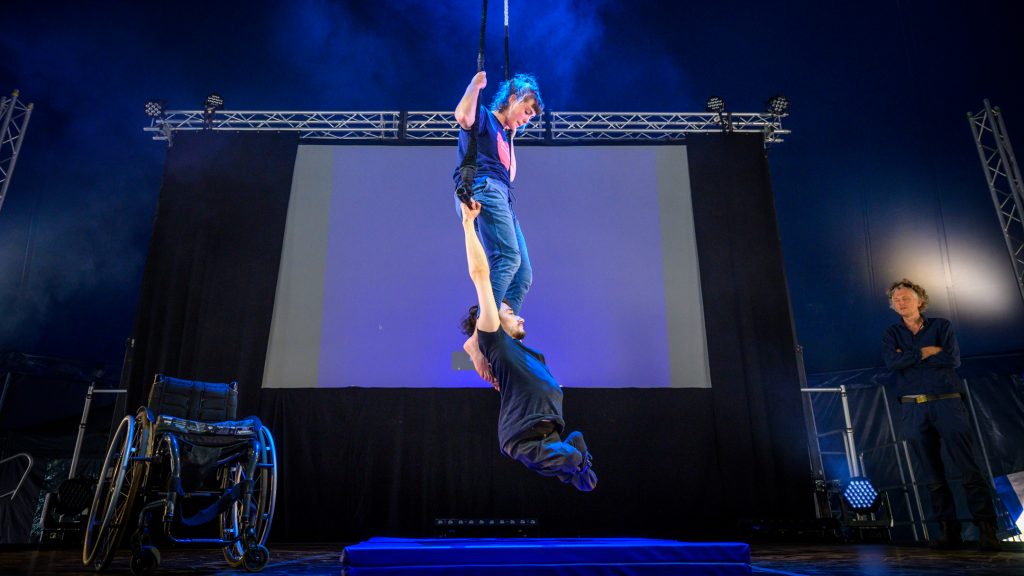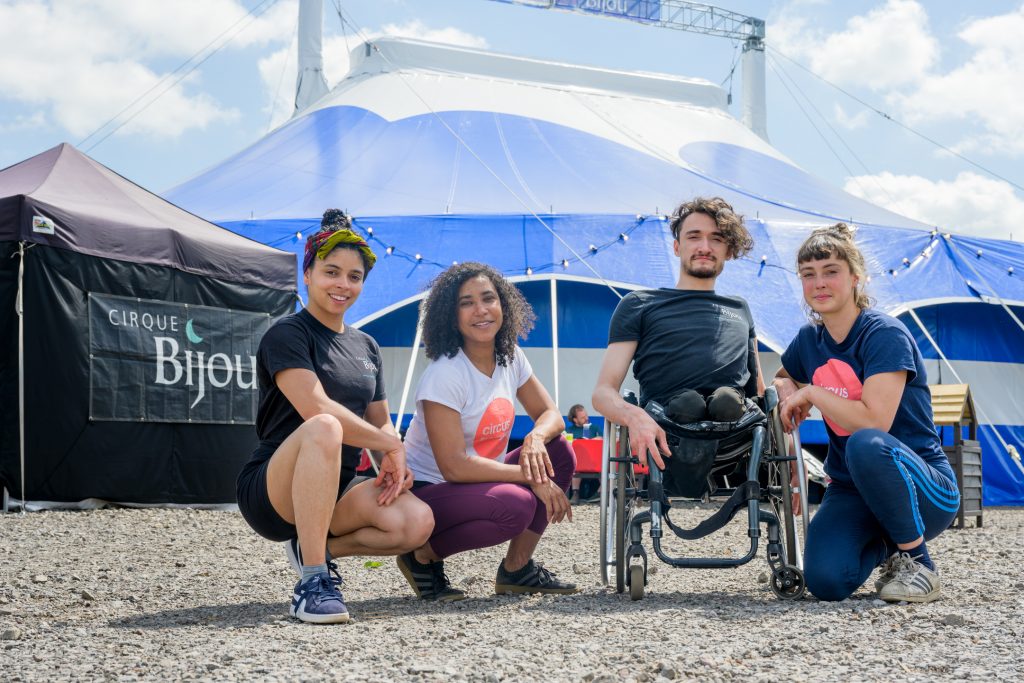In this, the second part of our series on Humane Employment, we’ll be taking a look at things from a producer’s perspective. If you missed part one – a performer’s experience, please also check out A Conversation with Jonny Leitch.
We can say ‘humane employment for all’, but for a production to go ahead, especially a touring one, it means endless tech rehearsals, long nights, and finding digs for the cast and crew wherever they can fit for the least amount of money, right? Not on Kate McStraw’s watch! We spoke to freelance producer Kate about working with us, touring Extraordinary Bodies’ show Human, and her experience of the wider industry.
Meet Kate

Interviewer: Welcome Kate – thank you for speaking to me. Let’s start by talking about work culture in the arts.
Kate McStraw: I think that absolutely it is the general vibe that the show must go on – you’ve got to do that at any cost. People, if they want to get ahead, they’ve got to act a certain way, be a certain way, make sacrifices. If you really want it, you’ve got to prove it, you’ve got to have the drive for it. I think that’s the kind of culture that we work in.
Then I think in the arts, we have this other layer that we are a group of others that sit outside of what are deemed to be ‘normal jobs’. There’s another layer probably, certainly calling on my own experiences here, of almost having to prove yourself because being an artist is ‘not enough of a job’. We’re constantly having to evidence that what we do is of value to greater society.
Interviewer: Perhaps to our parents as well?
Kate: Yes, definitely. To teachers, to parents, to peers. A lot of it is internalised, but this sense that it’s ‘not enough’ to be an artist, so I ought to be constantly proving myself in all of these different ways. I think also in the arts sector, what’s not helpful is that often the work is quite unstable. Short contracts, and everything reliant on the funds coming through. There’s this illusion that artists are swanning around living is really glamorous lives, but the reality is, it’s a huge amount of graft, a huge amount of sacrifice, it’s a huge amount of instability. That can all be really problematic. I think that’s the sort of culture that we sit in.
The Show Must Go On?
Interviewer: What you were saying about ‘the show must go on’, that’s literally a trope of theatre in particular. We see plays and films about people dancing on a broken leg and being celebrated for it, or people having a breakdown and weeping backstage and then going on with a smile. Young artists grow up thinking that’s a goal – to suffer and perform regardless. There’s something ghoulish about it!
Kate: Yes, definitely. I suppose there’s that creating this sense of a hero culture. That your art is greater somehow if you had to overcome hardship in creating it. There’s this trope, I suppose about artists being penniless, artists being damaged souls in some way. That’s a damaging assumption, because it means we’re happy with artists existing in those circumstances – it’s almost what we expect of them. It feels like it’s embedded: “I must work every hour under the sun to do this.” I’m just thinking about other phrases that are coming to mind as we’re talking. How about “You’re only as good as your last job.”
Interviewer: I hear that a lot in the industry.
Kate: Yes, exactly: “you’re only one mistake away from never working in the industry again.” There’s that joke, isn’t it, like if you make a mistake, or take your foot off the accelerator for a moment “Oh, you’ll never work in this industry again,” type of thing. But it’s not really very funny is it? That phrase has haunted me as a creative in this sector! The idea that it doesn’t matter what success rate I have behind me, whatever you deem to be successful, which is of course subjective, but whatever someone deems successful, there’s still this sense of, “I could lose it at any point.” I could lose my talent, I could lose my gift, I could lose my ability to do this job. I could have children. I could get injured. I could have other caring responsibilities.” Any of those things would mean that I would have to step out of this otherwise all-consuming industry.
Interviewer: Do you think a lot of people are put off pursuing a career in the arts because of what they perceive to be a kind of endurance event for success?
Kate: I’m sure that’s true for a lot of people. The thing that’s really hard, I think, is that it’s really blurred between what is your job and what’s the thing that you love? It is an industry that thrives on people’s passion, people’s love of what they do, but the flip side of that is then quite often people think, “Well, you’re doing what you love,” and therefore, somehow that negates how much you need to be compensated for that. You should definitely should do it for the love of it. “Aren’t you an artist? Why should we be paying for this?”
I work with a lot of artists who if when the funding doesn’t come in, or the commission doesn’t happen, or the job doesn’t come through, they will still make that piece of art. They’ve had the idea and they are going to make it, irrespective of whether they’re paid for it or not. Their way of expressing themselves and existing in this world is to create the thing that only they can see in their head.
Interviewer: And perhaps the industry takes advantage of recognising that?
Kate: Right! That as a producer is a really, really tricky thing to sit with, of knowing that one way or another the artist is going to make it happen.

“I’m not interested in something burning so bright that it’s beautiful, but then totally burns out the artist!”
Kate: One of my jobs is to make sure that artists get paid fairly for their work and that we remove barriers that might prevent them from doing it. I do a lot of work in arts access and inclusion, which in itself says that we are acknowledging that the arts is exclusive and non-accessible. An entire section of the industry has sprung up, a whole field of people like me who are doing huge amounts of work to increase access and inclusion. That is progress, but it’s also a frank admission that change is urgently needed. We wouldn’t exist if the arts were inclusive.
There was a really amazing article that Daryl Beeton has just written for Total Theatre about taking over the mainstream and what that means for him as a disabled artist. A really interesting article talking about the fact that there’s a mainstream and that disabled artists should be in the mainstream, it’s just acknowledging all of the issues.
I’m starting to find that it’s not best to ask people: “What are your access needs?”, but instead to ask everyone “What do you need to do your best work?” Followed up with the question: “How do we make that sustainable?” I’m not interested in something burning so bright that it’s beautiful but then totally burns out the artist!
Interviewer: It’s not, “How can we bring your best and then if you need to collapse afterwards, we’ve done a good job,” it’s making sure that that person does well and is not destroyed by it.
Kate: Exactly. Whatever the success looks like, whatever that good looks like to them should feel good too. All directors and producers need to be thinking ‘how do we support people so that they can keep performing, that they can keep writing, that they can keep directing, that they can go from all those different roles and try things out if they want to without putting themselves at real risk, emotional risk, physical risk?’
Interviewer: How to avoid the roller coaster?
Kate: It’s probably impossible to avoid altogether – we work in an emotional, risk taking industry – but we should try – we should prioritise the people.
“Thinking in terms of the human cost of overworking shouldn’t be exclusive to the Accessible Arts sector.”
Interviewer: Can we talk about some of the practicalities of a standard production that is not holding access at its heart? For example, production week is a notoriously gruelling time for a show. You’ve already probably been slogging in rehearsal for however many weeks. When you get to actual production week, we’re talking maybe one, maybe two techs depending on how technically complicated this show is, the dress rehearsal, maybe a second open dress too?
Kate: In theory, there are union contracts, designed to protect everyone from overwork, but not everyone’s part of a union. And if they not protected, they’re under pressure to work longer hours, and if one or two people have to, it spills out until everyone is! Even with fully unionised casts and crews, not everyone adheres to the guidelines. Also, in all of these things, there are clauses called ‘mutual agreements’. You can break anything in the contract on mutual agreement!
For example, it might say in your contract the maximum you should work is a 10-hour day. That’s still a long day – and perhaps you need to get home to look after your kids, or you physically cannot go longer than that without consequences. Now imagine that everyone else in the team is going to work a 16-hour day, on mutual agreement. Now suddenly you are the only one in the room suggesting that you need to leave. How many artists, who don’t forget are constantly made to feel they should be grateful for work, are going to stick to their guns and leave, and how many will give in to the pressure and stay the 16 hours?
Even without that 10 hours is already quite a long day and remember that 10 hours is after breaks. It might be that maybe your call time is 9:00am till 9:00pm and then you’ve got an hour for lunch and two half-hour tea breaks. That’s a 10-hour day, but the reality is you have been in that space for 12 hours plus your commuting time.

Interviewer: What about the production team, when do the backstage people arrive?
Kate: Yes. Again, for the production team, that should theoretically also be a 10-hour day. On stage, backstage. But the reality is that you want your performers to start work at 9 on the dot right? So practically speaking, when did the backstage manager have to arrive to ensure everything was set up to begin at that time? In addition to that, if something has come up during that long, exhausting day that isn’t working and everyone will be returning to the space at 9:00am the next morning, the directors, the choreographers, producers and people like that are not in those sorts of contracts. The creative team don’t work a set number of hours because they’re paid a fixed rate to deliver a job.
What happens is you finish at 9:00pm at night, and then your directors and your choreographers and your composers and musical directors, will keep on working so that by the time the cast and crew come back in at 9:00am the next morning they’ve worked out how they’re going to fix the problem. They might literally be rewriting sections of the show, they might be going, “This whole dance section doesn’t work, we need to completely re-choreograph this.” They’ll be doing all of that intense problem-solving in those hours.
Interviewer: Yes, through the night.
Kate: Yes, overnight so that it’s solved by 9:00am the next morning. That’s to ensure that they’ve then got the most out of the 10 hours of the people when they’re coming back the next day. The hit is all the way around. A production week should only be a week. I have worked on shows where it’s more like a production fortnight when they’re more complicated and larger scale.
Interviewer: And at the end of that grueling experience, on goes the show.
Kate: Yes exactly.
How does Humane Employment work in a real production?
Interviewer: At Diverse City and at Extraordinary Bodies, humane employment is something that we’re trying to hold at the centre of everything we do. Part of equity in the arts, part of accessible arts for our audiences and for performers of all kinds and creatives of all kinds is that we do not exclude people by making it impossible for them to participate. What does it look like? What do we mean? You are a producer, it’s you who has to actually make this happen. It’s all very well for the company to say, “Right, Kate, this is important, making sure that everyone can work to their best ability without burning out, off you go, and by the way that also includes you.”
Kate: There’s a lot! Well, for starters, we never contract a 10-hour plus breaks day. We contract an eight-hour plus breaks day, for example, which means we’re looking at a maximum of a 10-hour day for most people, but with eight hours working. In addition to that, we deliberately include gentle starts to the day. Some companies would say you start at 9:00am and you need to be warmed up by then, so actually, for an aerial artist for example, that’s an hour’s warmup before. Do you know what I mean? Suddenly, you actually begin every day with an hour of unpaid work!
Interviewer: And if you don’t, that’s on you, it’s your own responsibility to make sure you don’t get injured, right?
Kate: Right. So instead of that mindset we put warm-ups into the schedule. It’s not like, “And you need to be ready for that period of time.” That’s already better practice and that’s a really, really simple fix. Then we talk about breaks with the team and what they need first, before we write the schedule because there’s no point in, say, having a lunch break at one o’clock if that won’t meet someone’s needs. Then similarly, in some companies, the scheduled breaks will get moved because you haven’t quite finished that scene – what difference does another half an hour make? But it makes a huge difference! We preset our breaks and then we stick to them no matter what.
In Human, for example, we had parents that are breastfeeding on tour with us. Therefore, they need to break because their children need to be brought into rehearsals so that they can feed at specific times. Delaying half an hour might have physical consequences for a performer because they didn’t get to rest when they thought they would. What if you need to take medication at a specific time? If we miss or move the break, we are putting our performers at risk. I think we’re really good at boundaries working, where we collectively agree what works for us and then we adhere to that. Our stage managers do an amazing job of going, “It’s 15 minutes to a break” and then firmly: “we’re breaking.”
It’s also things like we have PAs in the room that can go and do things like get food so that artists have a full hour’s break rather than having to find a shop nearby, get the food, bring it back and then shove it down in 10 minutes, and then go walk back up and do aerial having had no real rest and no time to digest their food. It’s things like that. Being considerate of those small things make an enormous difference to everyone’s wellbeing.
We also put breaks between our rehearsal blocks. Recovery period times that was particularly important during COVID that we allowed breaks to safeguard us, but that is practice that we will be moving forward, that we want breaks between blocks.

I’ve had lots of conversations with artists recently across companies that I work with, that they are supported when they work with us. We really think in detail about where the accommodation is in relation to venue, that it’s within a 10 minutes walk, that it’s actually accessible to them, that we’ve got baths because the work that we’re doing is really physical for the aerial performers, and so having a bath is a really, really important thing for body recovery. Thinking about having double beds where they’re accommodated rather than single beds that people can stretch out properly. It’s all of these things, but they seem quite small.
These are really adjustments that can be made that make it just a nice environment for everyone working on the team. I tell you what, we have huge loyalty of people that work with us. They work with us time and time again because we are respectful of them and do everything in our power to provide support to meet their needs. These performers are hugely talented and they’re in demand – they could work anywhere they like, but they know that they can trust us.
“Real change will be wholesale, not just for creatives with access needs.”
Interviewer: I think we need a wholesale mindshift in the industry. By accommodating not just the needs of people who maybe have access requirements, but everyone you work with, you’re supporting them to produce the best possible work. There’s this misconception that accommodations are something only disabled performers can or should benefit from. If you create a humane work environment, you are benefiting the company, the production, and you’re going to end up with better art.
Kate: I think that’s what it comes down to. I think the reality is that we’re in an industry where, especially in the commercial sector, people talk about the bottom line. I understand that there’s a budgetary limitation. We work in a subsidised sector, meaning that we get government funding to make the work.
I think there’s a bigger layer of subsidisation that goes on that we are not talking about very much, which is the fact that everyone in the team works longer hours than they’re being paid for, they’re not being treated fairly, that they’re putting in a huge amount of extra strain on their lives by doing things like paying for physio themselves because they’ve injured themselves doing the show under your direction, that they’re paying for childcare so that they can come to rehearsals.
Humane practice is about going, “What’s the real cost to this? What’s the cost if we get it wrong? During COVID, the cost was that people might die. When you literally are faced with that, you really have to question the choices that you make.
If the show goes on at any cost, you really have to think ” I’m not willing to die for this.” It’s a process – I think about the amount of times I have worked when I have tonsillitis and things like that. I think about when I have worked alongside creatives who have given birth and are back in rehearsals a week later and they’re applauded for their commitment.
Interviewer: Yes, celebrate people for working until they break. Celebrate people for working until they break and then you expect them to pick up and do it again.
Humane employment should be the norm
Kate: A lot of times during Human, people have a people in the team have approached me time and again and thanked me for the work that we’re doing in terms of supporting our team. And all I just say is, “It’s my job. Thank you for acknowledging the work, the effort that we’re going to, but really, this should be the norm.”
I hate that it’s so outstanding that we have booked accommodation that’s five minutes from the venue, or that we have booked a PA, or that we have put catering on because there’s nowhere nearby to get food, or that we have put breaks in at a time and finishing at 4:00pm rather than 5:00pm so that someone can go and breastfeed their child. I just want that to be the norm.
Interviewer: Do you think the industry is changing?
Kate: Yes. I think some of the industry is changing. I think that there are more and more companies like Diverse City and that work in humane ways. I think it’s pretty revealing that those progressive companies are often diverse-led. It’s literally like: “See what can be done if we listen to a greater variety of leadership?!” I also think that the more work we do, the more people we work with, the more artists see that they don’t have to endure hardship as a standard. I think it will just keep filtering out from us – that everyone we work with with go on to spread good practice with the next people they work alongside and so on.
I’m really hopeful. There’s a lot of stuff that is very normal practice now, which 10 years ago, people weren’t talking about, even five years ago, people weren’t really talking about access at all, they weren’t really talking about sustainable practice. What they were talking about is resilience, “How do we make workforce more resilient?” Now we’re flipping that to, “It’s not a me problem, it’s not that I’m not resilient enough, it’s that you’re not supporting me to be sustainable.” I think that’s the flip that I like that I’m really interested in.
Interviewer: Thank you very much.
Hear more from Kate on this subject in her article for Arts Professional.





